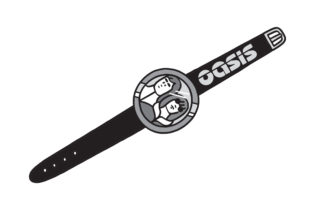Is a woman without a watch really to blame for Oasis?
No, she's not

No, she's not
Judging by everything I’ve read and know about Alan McGee – a man who only lets legacy get in the way of talking about how many drugs he’s taken (almost every page of his autobiography practically ends “needless to say, I had the last line”) – I’m sure there’s a short answer to this question, and that answer is most probably no. Still, if you’re going to allow any of McGee’s grand myths, you should probably make it the one about him discovering and signing Oasis. It’s a good story – the start of a very British carry-on that ends with one brother throwing a plum at the other.
The story, in case you don’t know it, goes like this: Alan McGee is the happy hell-raiser of Creation Records who are doing some pretty dreamy things from a shithole office in pre-yoga Hackney. On 31 May 1993, one of his bands, 18 Wheeler (a group you probably won’t remember considering Tony Blair introduced them as Wheeler 18 at a 1996 Labour Party conference even though their name was written down for him), are playing King Tut’s Wah Wah Hut in Glasgow, so McGee heads home to Scotland to see them. For extra fate points, the opening band on a bill of three aren’t even Oasis – they’re friends of Oasis who tell the Gallaghers to come up to Glasgow anyway, precisely because McGee will be there. They’ll deal with the issue of getting the promoter to allow them to play once they’re there, which they do by threatening to smash the place up. This much of the story is wholly believable. You get the sense that Noel Gallagher has never taken no for an answer, and a fight could have provided him with an early opportunity to accidently punch Tony McCarroll amidst the confusion. Oasis, then, are in character here, enough perhaps to detract for McGee’s explanation for arriving at a small music venue not just in time to see the opening act of three, but to even see the bonus band the promoter didn’t even book. As McGee told NME: “Now, I wouldn’t have got to see them [Oasis] normally, because when a band of mine’s playing I usually get in five minutes before they come on stage. However, because I’d gone with my sister Susan, who doesn’t happen to own a watch, I got there two hours early.” Hmmm.
The two hours doesn’t quite stack up, but we all condense time when looking back and McGee was doing a lot of drugs back then. Still, I’m sure you’ve turned up to a gig to see a headliner just before they’re on at half 9, say. Or done anything at half 9. It feels distinctly different to half 7, doesn’t it? I mean, even without looking at your watch, you can pretty accurately sense when it’s half 7 at night compared to half 9. Try it tonight.
I’m not sure that anyone has ever arrived at any place they’re planning on going to 2 hours early and not seen it coming before getting there. Being 2 hours early doesn’t sneak up on you, does it? I can’t be the only person who’s never turned up somewhere and only realised ‘shit, I’m 2 hours early’ the moment I’ve arrived and it’s too late to kill time hovering around Boots.
So there’s that. But there’s also the fact that Susan has been thrown under the bus here. Susan doesn’t have a watch – and good for her – but presumably neither does Alan. That’s the only point I need to make on that.
“The first song was really good,” McGee remembers of that show. “Then the second was incredible. By the time they did this fantastic version of ‘I Am The Walrus’, I’d decided I’ve got to sign this group, now.” It’s a powerful embodiment of how much Oasis owe their career to The Beatles that it was a Beatles song that got them their deal, although, to be fair, The Beatles pulled that one covering their hero, Chuck Berry.
But it’s a good story, isn’t it? Two Glaswegian siblings, neither with a watch or the forward planning skills to arrive at a destination remotely close to their desired time, discover a phenomenon who shouldn’t even be there and are particularly blown away by their cover of ‘I Am The Walrus’.
Of course, is doesn’t matter how much of it is true, or if it all ended when one of them threw a plum at the other. A comic-book band like Oasis deserve these myths of struggle and chance, and Alan McGee has always written the tales so well.
I purposefully used the word ‘blame’ (for Oasis) because it’s juicier and more fashionably cynical than ‘thank’, which is how I really feel about Susan, if indeed she’s ever existed. However it happened, McGee did find Oasis at King Tut’s, which made ’90s music what it was, culturally more than anything else. If Labour had gotten in in an Oasis-less world, who would have been there to shake Tony Blair’s hand if not Noel Gallagher? Who would have performed at the 1996 Labour Party conference? Probably not even Wheeler 18.